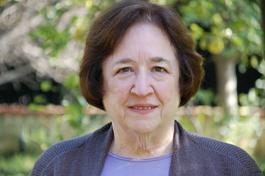 |
|
| Helen Vendler | |
Helen Vendler, one of the leading poetry critics in the U.S., "with a reputation-making power that derived from her fine-grained, impassioned readings, expressed in crystalline prose in the New Yorker and other publications," died April 23, the New York Times reported. She was 90. In an era dominated by post-structuralist and politically influenced literary criticism, Vendler, who taught at Harvard for more than 30 years, "adhered to the old-fashioned method of close reading, going methodically line by line, word by word, to expose a poem's inner workings and emotional roots."
"Vendler has done perhaps more than any other living critic to shape--I might almost say 'create'--our understanding of poetry in English," poet and critic Joel Brouwer wrote in 2015 in the New York Times Book Review, adding, "Were it not for Harold Bloom, the 'perhaps' would be unnecessary."
Bloom once said of Vendler: "She is a remarkably agile and gifted close reader. I think there isn't anyone in the country who can read syntax in poems as well as she can."
She offered fresh interpretations of George Herbert, Wallace Stevens, Seamus Heaney, the Keats of the odes and the Shakespeare of the sonnets--all 154 of them, analyzed in a thick volume, The Art of Shakespeare's Sonnets (1997), which poet Richard Howard called "the most intricately inquiring and ingeniously responding study of these poems yet to be undertaken."
Vendler was the poetry critic for the New Yorker from 1978 to 1996, a frequent judge for the Pulitzer Prize and the National Book Award, and a nominator for the MacArthur Foundation's "genius" awards. She devoted her attention to the poets she loved, in a lifelong engagement with the branch of literature she called, in the introduction to her essay collection Part of Nature, Part of Us: Modern American Poets (1980), which won the National Book Critics Circle Award for Criticism, "the one form of writing that is to me the most immediate, natural and accessible," the Times wrote.
In 1959, Vendler became the first woman to be offered an instructorship in Harvard's English department, a year before she received her doctorate, having submitted a dissertation on William Butler Yeats that was published in 1963 as Yeats's 'Vision' and the Later Plays. After leaving Harvard she taught at Cornell, Haverford, Swarthmore, and Smith. She began teaching at Boston University in 1966 and joined the English department at Harvard as a full professor in 1985.
"The base of poetry in the emotions was tacitly ignored in scholarship and criticism: and yet I felt one couldn't understand the way a poem evolves without acknowledging that base," she wrote in her introduction to the essay collection The Ocean, the Bird and the Scholar (2015). "If there was any conscious drive in me to alter the field of criticism as I encountered it, it was to insert into the analysis of lyric an analysis of its motivating emotions and convictions, and to demonstrate their stylistic results."
Two early works--On Extended Wings: Wallace Stevens' Longer Poems (1969) and The Poetry of George Herbert (1975)--established Vendler as an important critical voice. Her essays and reviews were gathered in The Music of What Happens: Poems, Poets, Critics (1988); Soul Says: On Recent Poetry (1996); and other collections.
Her many studies include The Breaking of Style: Hopkins, Heaney, Graham (1995), The Given and the Made: Strategies of Poetic Redefinition (1995), and Last Looks, Last Books: Stevens, Plath, Lowell, Bishop, Merrill (2010).
In 2004, the National Endowment for the Humanities named her a Jefferson Lecturer, the highest honor the federal government bestows on a scholar of the humanities. In her interview with the Paris Review, Vendler compressed her critical method into seven words: "I write to explain things to myself."
Pulitzer Prize-winning poet and Harvard colleague Jorie Graham, who had barely heard of Vendler when she reviewed Graham's earliest work for the New York Times in the 1980s, told the Boston Globe: "Helen understood that all poets needed what she did so they could take the next step.... I encountered the most lucid account of what I was doing that I could ever hope for. She certainly taught me right away that there was more to a poem than I could fathom on my own."

